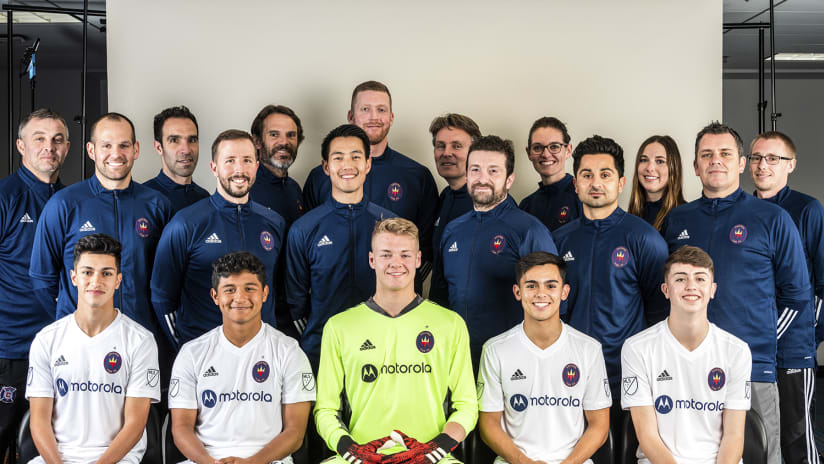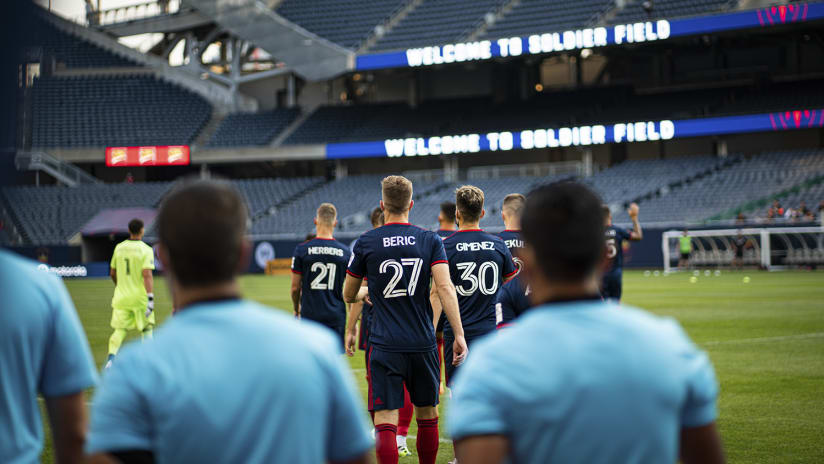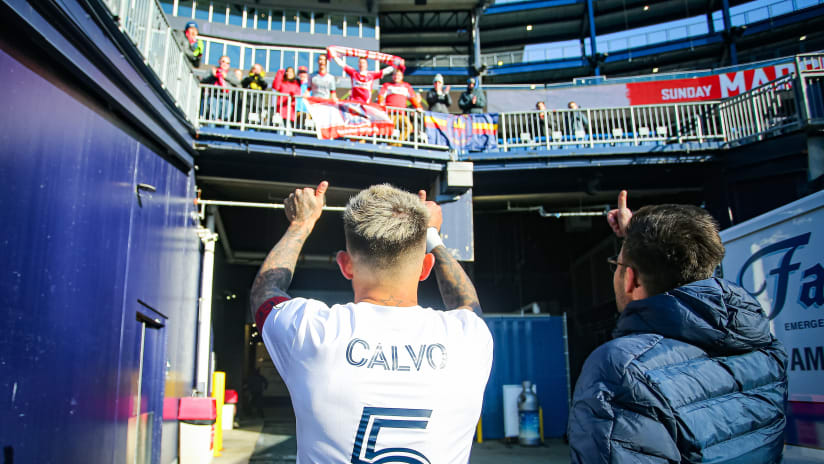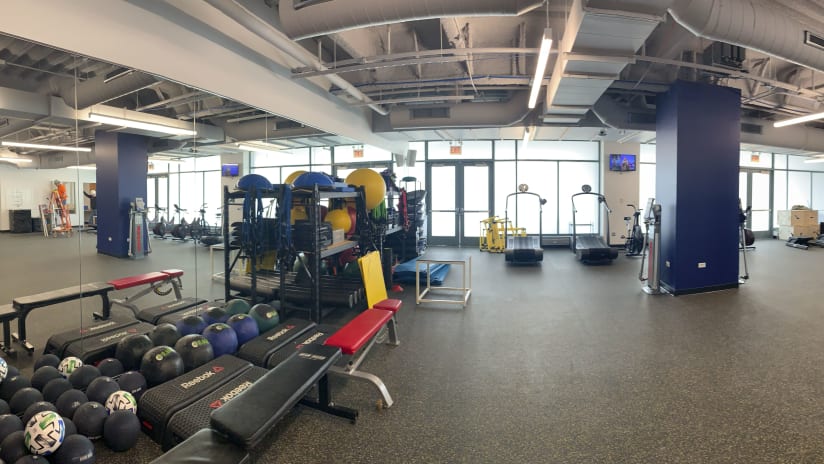A week ago last Thursday I had a meeting scheduled with our Sporting Director Georg Heitz. We were planning to talk about a development that had been bubbling along nicely throughout the week — a clutch of Fire Academy players were being announced daily as newly signed homegrown professionals, and we were going to talk about what this represented for the future of the Club.
I was just closing my laptop to head over to meet Georg, when my email pinged to indicate a staff-wide announcement…
In the days since, it’s been hard to see positives in the challenge all of us are facing right now, and from the feedback from the academy staff it’s been particularly tough for Chris Brady and Allan Rodriguez, who had the biggest announcements of their lives so far delayed by the extraordinary circumstances. Instead of the big splash of them joining Brian Gutierrez, Javier Casas, and Alex Monis in a week-long run of homegrown signings, unprecedented in MLS history, they found themselves sitting at home like the rest of us, trying to adjust to a new regime of virtual workouts and social distancing, waiting for their day.
The Club still felt it was important for each player to have that day though, and while it won’t appear like much of a silver lining for the pair who had to wait, it did perhaps illustrate a theme each of their mentors hit consistently when I discussed the signings with them — “the final step is the hardest.”
- Read up on each Fire homegrown signing:
With the final two announcements confirmed this week, I picked up the conversation with Heitz, and he reiterated that idea to describe the challenge of managing the development of these young players:
“They’ve been used to starting every game on a winning team and the idea that now they’re going to all come in and get 1400 minutes — no. They have to be patient and continue their development and we have to manage that carefully and they have to deal with that.”
For Cedric Cattenoy, the Academy Director, that sentiment is expressed in two of the basic principles of development:
“Challenge. Confidence…Challenge. Confidence. In 2018-19 we played these boys up a year and this year they’ve played in their regular age group. You have to manage their environment. You make it too tough for them and they lose confidence, but if you don’t challenge them, they won’t take the next step.”
Setting expectations for player development with players and parents is part of Cattenoy’s job. He came to the Club from heading the Academy at Paris Saint-Germain, and had to adjust to a different landscape and fundamental mindset than the one that governed youth development in Europe.
“The first year here was very hard. We were trying to put in place the best system for the players, but the results [the scores in the games] were not good, so you have parents wondering if their sons are in the right place. Over here, at youth level, there can be a tendency to think, ‘If the team is winning, they’re in the right place,’ We were losing that year and at that point nobody was talking positively about the ‘coach from PSG’ anymore.”
Still, Catenoy had faith in his methods and the team around him, and crucially, he had the faith of the then GM and team President, Nelson Rodriguez.
“He believed in us and that it would take time to do the right things, and he showed that to us. And he was there at EVERY game. Every game. You lived in Manchester — can you imagine the president of Manchester United coming to every academy game? But it sent a signal, and it gave us confidence to do the right things.”
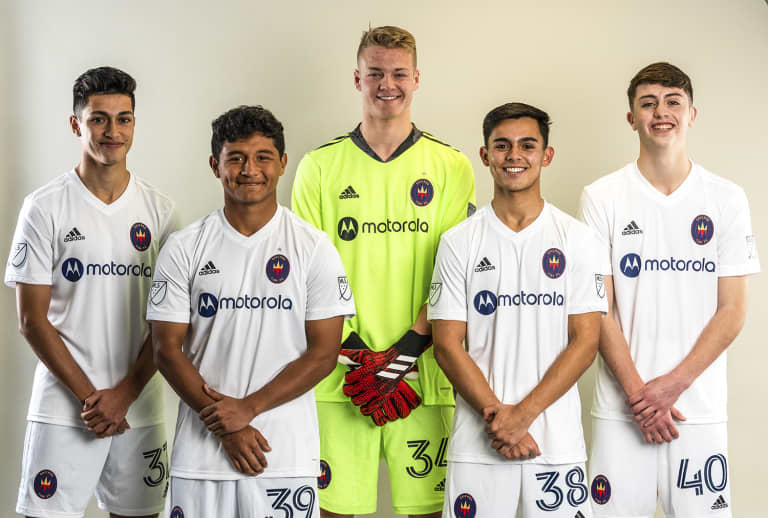
The ‘us’ in this case, includes a coaching staff who blend European experience and extensive local knowledge — the latter crucial. As Georg Heitz puts it, “There are, what, 10 million people in this region? We should be able to find one or two players. And then it’s about showing you are the best destination for them.”
It’s more than one or two this year, though. I put it to Heitz that one-off homegrown signings are always a heartening sign — seeing Nick Slolina join up with his brother Gabriel earlier in the off-season was a lift, as was the signing and then immediate impact on the field of Mauricio Pineda. Even for casual observers around the league, those type of isolated signings are seen as a bellwether of a more general MLS future that might be here in three years or ten years — a symbolic marker of potential growth.
But to sign seven homegrown players in an off-season and to have them join an existing complement of four, suggests less of a tendency and something that looks suspiciously like a policy.
“We do believe this is the right path for the Club,” says Heitz. “Honestly, was I pleasantly surprised at the youth standard when I came to the Club? Yes, a little. Coach Wicky and Sebastian [Pelzer, Fire Technical Director] and I met with Cedric and Brian [Roberts, Academy PASS Director] and it was a positive conversation, but I think at the end we kind of said, ‘OK, well, send us your best players and let’s see.’ They got in and around the first team — and coach Wicky is a very open-minded person anyway, and of course he’s had experience and is comfortable with youth players — and when we saw these boys doing well, it was really encouraging, and we began to look to secure them.”
Even as Heitz and Pelzer were retooling the first team from their global network, they were careful to make sure the encouragement went both ways for the tier of homegrown players pushing for consideration. When the team went out to Seattle for the first road trip they took the non-playing players, including the youth cohort, with them. With the sight of fellow homegrown Pineda going straight in to the starting XI, to join homegrown ‘veteran’ Djordje Mihailovic, there was plenty of opportunity for young players to visualize a future for themselves firsthand.
I mention taking the players on the road trip, and Heitz almost sounds surprised as he replies simply, but tellingly, “They’re our players. All of them.”
Still, nothing will be handed to them, so as Heitz emphasizes, the big step up for young players as they become professionals, will rely on them having the confidence to meet the challenge. That’s where the work of Brian Roberts and his player development PASS [Perform, Advise, Support, Serve] program will meet one of its sharp tests — the members of the Class of 2003 being signed right now, are the first group to have gone through a complete PASS cycle.
“Brian’s amazing,” says Heitz. “So passionate. You have to stop him working.”
Roberts is certainly a quiet force at the Club. Evangelical about player education on health, values, mental fortitude, and many areas of personal growth beyond technical development, he is also a link to senior management, and an active critical voice within the culture of the Club.
With the Academy’s newly expanded footprint at SeatGeek Stadium, and the physical space that can now be dedicated to all-round development, the program is set to go from strength to strength. But quietly, its robust methodology has already been drawing approval from elite academies around the world — when Roberts met with Per Mertesacker, head of youth development at Arsenal, on a fact-finding mission last year, the German was sufficiently impressed to remark his own club should be initiating some of what the Fire now regard as standard operating practice. Plans are under way to expand PASS offerings to first team players and eventually all Chicago Fire staff.
If the current crop of homegrowns are to thrive, they’ll need the all-round resilience they acquired at the Academy and via the PASS program. Yet regardless of immediate minutes, in the broader context of MLS the fact the homegrown players are here en masse is a significant statement of faith from the Fire. There are noted examples of best practice around the league — Dallas is routinely celebrated for its quantity of youth signings for example — but this critical mass of Chicago homegrown players is truly significant for both the sporting and economic model it suggests for the Fire going forward.
In turn, it’s a development in line with the increasing progression in MLS circles towards the league finding its true place in the global football market. In broad strokes, that’s meant younger Designated Players recruited to the league, in a mutually beneficial arrangement that may eventually be see some number of players sold to Europe, along with clubs making significant investments in their academies as a talent and potential revenue pipeline.
Finally, youth development has inherent uncertainties, if not downright inefficiencies, at even the biggest clubs in the world. So, the fact that Chicago is standing by its product right now is a bold and heartening statement of faith in the future. And we can all appreciate those right now.
Challenge. Confidence.

